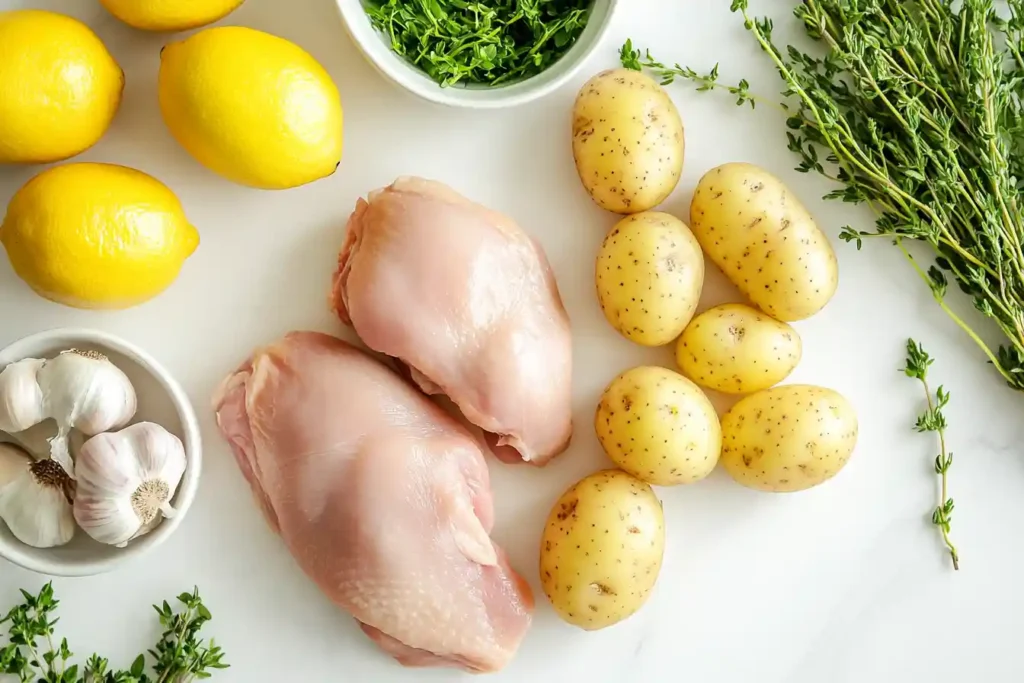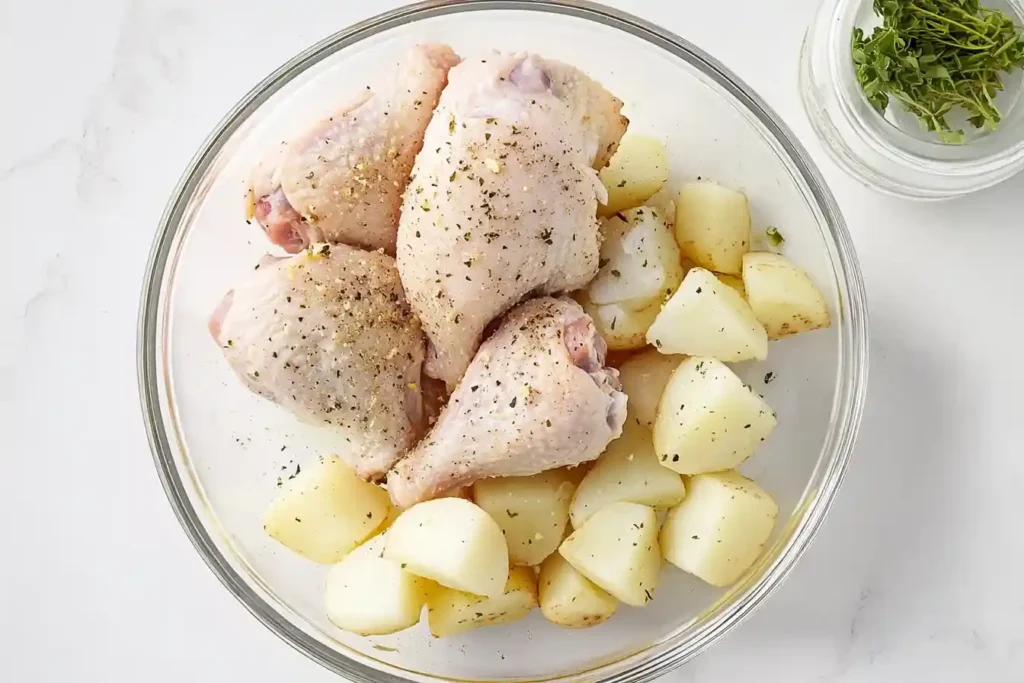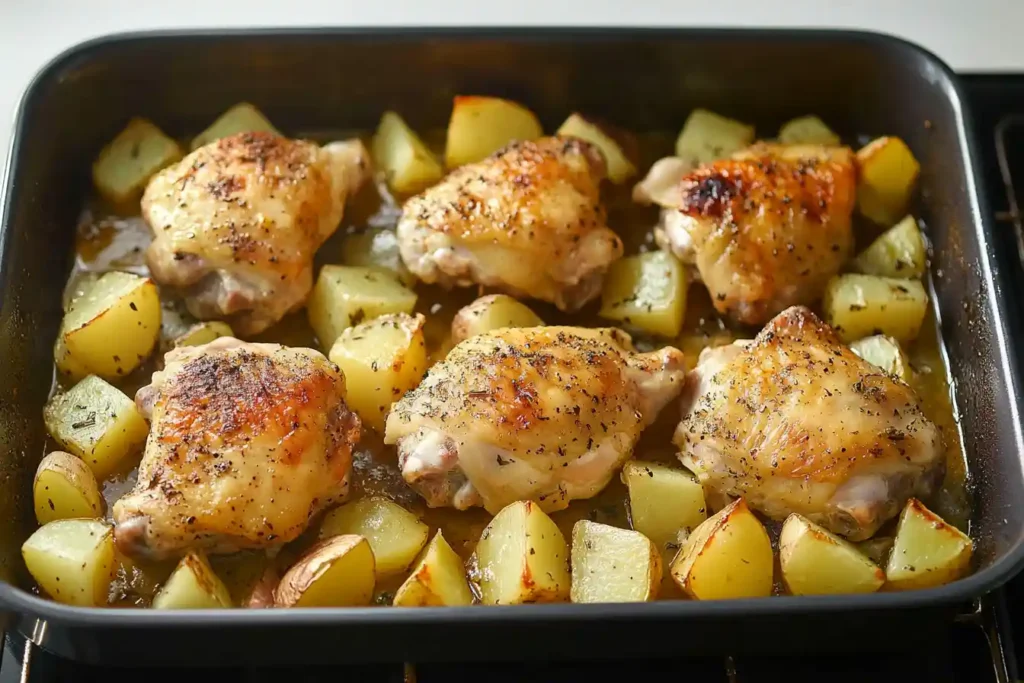Greek cuisine is celebrated for its vibrant Mediterranean flavors and healthful ingredients. In this article, we explore an authentic take on Greek Lemon Chicken and Potatoes—a dish that marries tender chicken with tangy lemon and aromatic herbs. Whether you’re a seasoned cook or a newcomer to Mediterranean cooking, this recipe promises a delightful balance of savory and zesty notes. With roots steeped in tradition, this dish not only pleases the palate but also nourishes the body.
Table of Contents
Overview of Greek Cuisine & Mediterranean Flavors
Greek cooking is all about simplicity and fresh ingredients. The use of lemon, garlic, and olive oil forms the backbone of many dishes, and our recipe is no exception. You might even come across variations such as lemon garlic chicken or even regional twists like kotopoulo lemonato—each adding its own layer of complexity to the dish. These expressions of flavor are reminiscent of other popular recipes like chicken lemon akis and even adaptations seen in creamy dijon chicken preparations, though our focus remains firmly on the Greek tradition.
Health Benefits of This Classic Oven-Roasted Recipe
This dish isn’t just tasty—it’s also nutritious. The lean protein from the chicken, combined with the healthy carbohydrates of potatoes and the antioxidant power of lemon and herbs, makes it a well-balanced meal. Furthermore, this recipe can easily be adapted for various dietary needs. For instance, while many might lean towards chicken thigh recipes for extra flavor, you can substitute with breast meat if you prefer a leaner option. The dish’s natural ingredients also align well with popular trends like the chicken cabbage recipe and even provide a contrast to heavier meals like a recipe chicken lasagna.
Recipe Inspiration and Background
Historical Roots of Greek Cooking
The Mediterranean diet is renowned for its heart-healthy benefits and vibrant flavors. Our Greek Lemon Chicken and Potatoes draws from centuries-old culinary traditions where fresh produce, robust herbs, and citrus fruits were staples. The dish’s simplicity is its strength—each ingredient is allowed to shine, creating a harmony of taste that has been cherished for generations.
What Makes This Recipe Unique
What sets this recipe apart is its method of oven-roasting, which ensures that the chicken skin becomes perfectly crisp while the potatoes absorb all the zesty marinade. The infusion of lemon and garlic creates an irresistible aroma, making this dish a favorite among those who love both classic and innovative recipes. Additionally, when compared to other variations like creamy dijon chicken, this dish leans on natural ingredients to deliver a clean and refreshing flavor profile.
Ingredients and Their Benefits

One of the best parts of this recipe is its straightforward ingredient list, which is as wholesome as it is flavorful. Below is a table summarizing the key components and their benefits:
| Ingredient | Benefit |
|---|---|
| Chicken (preferably thighs or breasts) | Provides high-quality protein; thighs add extra flavor, while breasts offer a lean option. |
| Potatoes | A great source of energy and fiber; they absorb flavors beautifully. |
| Lemons | Rich in vitamin C and antioxidants; lend a refreshing, tangy flavor. |
| Garlic | Boosts the immune system and adds depth to the marinade. |
| Olive Oil | A heart-healthy fat that enhances the flavor profile. |
| Fresh Herbs (such as oregano and thyme) | Imparts a distinct Mediterranean aroma and taste. |
| Salt & Pepper | Essential seasonings to balance and elevate natural flavors. |
Fresh Chicken & Potatoes: The Protein and Carb Power Duo
Chicken and potatoes are a dynamic duo in this recipe. The chicken not only provides a lean source of protein but also carries the marinade’s bold flavors deep into the meat. Meanwhile, the potatoes act as a savory canvas, soaking up every drop of the lemon-infused juices. This pairing is reminiscent of many comforting dishes, whether you’re making a classic lemon garlic chicken or experimenting with regional variations like kotopoulo lemonato.
Zesty Lemon, Garlic, and Herbs: The Heart of a Greek Marinade
At the core of this recipe lies a vibrant marinade, combining freshly squeezed lemon juice with garlic and a medley of herbs. This mixture not only tenderizes the chicken but also infuses it with a fragrant zest that is both bold and refreshing. The balance of acidity and herbaceous notes ensures that every bite bursts with flavor—a key reason why this dish remains a beloved staple in Greek households.
Optional Add-Ins and Substitution Ideas
While the traditional recipe focuses on the classic ingredients, there’s plenty of room for creativity. If you’re inspired by other dishes—perhaps by chicken lemon akis or even creamy dijon chicken recipes—you might consider adding a touch of cream or Dijon mustard to the marinade for an extra layer of richness. Alternatively, for those who enjoy experimenting, a hint of cabbage could be incorporated, nodding to the flavors found in a chicken cabbage recipe.
Step-by-Step Preparation
Getting your Greek Lemon Chicken and Potatoes just right is all about careful preparation and attention to detail. Follow these steps to ensure a perfectly roasted meal.
Preparing the Chicken
Trimming, Marinating, and Seasoning Techniques
- Trim and Clean: Begin by trimming any excess fat from the chicken. For a richer taste, opt for chicken thighs, although chicken breasts work well for a leaner version.
- Marinate: In a large bowl, mix together freshly squeezed lemon juice, minced garlic, olive oil, and your chosen herbs. This marinade will work wonders, similar to what you’d expect in a traditional lemon garlic chicken recipe.
- Season: Generously season the chicken with salt and pepper. Allow the meat to marinate for at least 1-2 hours, or even overnight for a more intense flavor profile. This technique is also common in recipes like kotopoulo lemonato, ensuring the flavors penetrate deeply.
Prepping the Potatoes
Cutting, Seasoning, and Parboiling Methods
- Cutting: Wash and cut the potatoes into uniform wedges or chunks. Consistent sizing ensures even cooking.
- Seasoning: Toss the potato pieces in olive oil, salt, pepper, and a sprinkle of herbs. This not only enhances their natural flavor but also prepares them to soak up the marinade.
- Optional Parboiling: For extra tender potatoes, consider parboiling them for 5 minutes before adding to the roasting pan. This step guarantees a soft interior while the exterior crisps up nicely in the oven.
Cooking Techniques and Methods
Achieving Crispy Chicken Skin and Tender Potatoes
A key to the success of this dish is balancing crispiness and tenderness. Begin by preheating your oven to 400°F (200°C). Arrange the marinated chicken and seasoned potatoes in a single layer on a baking sheet, ensuring there is enough space for even roasting. The goal is to let the ingredients roast together so that the potatoes absorb some of the savory chicken drippings, enhancing their flavor.
Temperature Control and Optimal Cooking Time
Roast the dish in the preheated oven for approximately 45-55 minutes. About halfway through, baste the chicken with the pan juices to keep it moist and enhance the crispy skin. Check the potatoes for tenderness with a fork—they should be golden and crispy on the outside, yet soft on the inside.
Plating and Presentation
A visually appealing presentation can elevate your Greek Lemon Chicken and Potatoes from a simple meal to a memorable dining experience. Thoughtful plating not only enhances the dish’s appeal but also invites you to savor every bite.
Garnishing with Fresh Herbs and Lemon Slices
For an eye-catching presentation, garnish your plate with a generous scattering of fresh herbs like oregano or thyme. Place a few thin lemon slices on top of the chicken or artfully arranged around the plate. These vibrant colors not only add visual contrast but also hint at the zesty flavors within.
Serving Suggestions for a Complete Mediterranean Meal
Consider pairing your Greek Lemon Chicken and Potatoes with a crisp side salad or a light tzatziki dip. A bowl of Greek salad, with cucumbers, tomatoes, olives, and feta, complements the dish perfectly. You can also serve a side of warm pita bread to soak up the delicious juices. For a twist, try adding a spoonful of hummus or a drizzle of extra virgin olive oil for added richness.
A table below offers a quick guide to serving suggestions:
| Side Dish | Flavor Profile | Serving Tip |
|---|---|---|
| Greek Salad | Fresh, tangy, and savory | Toss with a splash of olive oil and a squeeze of lemon juice. |
| Tzatziki Dip | Cool and creamy | Serve in a small bowl with a drizzle of olive oil on top. |
| Warm Pita Bread | Soft and slightly chewy | Warm in the oven and serve folded with a sprinkle of za’atar. |
| Hummus | Smooth, nutty, and creamy | Drizzle extra virgin olive oil and garnish with paprika. |
Nutritional Information and Health Benefits
Eating well is about balancing flavor with nutritional value. Greek Lemon Chicken and Potatoes not only bursts with Mediterranean zest but also offers a range of health benefits that make it a standout dish in your weekly rotation.
Caloric Breakdown and Macronutrient Insights
- Chicken: A lean protein that aids in muscle repair and overall body maintenance. Chicken thighs, while slightly higher in fat than breasts, are rich in flavor and provide essential amino acids.
- Potatoes: An excellent source of complex carbohydrates, providing sustained energy. They also contribute dietary fiber, which is beneficial for digestion.
- Lemons: Packed with vitamin C and antioxidants, lemons help boost the immune system and add a tangy kick without the need for extra calories.
- Olive Oil: A heart-healthy fat known for its anti-inflammatory properties and benefits to cardiovascular health.
This combination of ingredients supports a balanced diet. It’s a dish that fits well with various dietary needs, be it gluten-free, low-carb (with slight modifications), or simply a hearty, nutritious meal.
Dietary Considerations
- For Gluten-Free Diets: This recipe naturally avoids gluten, making it an excellent option for those with gluten sensitivities.
- For Low-Carb Diets: While potatoes are a carbohydrate source, you can reduce the quantity or swap them with a lower-carb vegetable like cauliflower if desired.
- High-Protein Needs: The chicken component ensures a high protein intake, perfect for active individuals or those focused on muscle building.
By keeping these nutritional insights in mind, you can adjust the recipe to meet your specific dietary goals without sacrificing flavor.
Variations and Creative Twists
While the classic Greek Lemon Chicken and Potatoes recipe is a tried-and-true favorite, there’s plenty of room for creativity in your kitchen. Experimenting with variations can cater to different tastes and dietary preferences, ensuring that you never tire of this delicious dish.
Spicy Greek Lemon Chicken Variation
For those who enjoy a little heat, add red pepper flakes or a dash of cayenne pepper to your marinade. This twist transforms your dish into a spicy delight while still preserving the essential Mediterranean flavors. A spicier version can be a refreshing change, especially when paired with a cooling yogurt-based dip.
Herb-Infused Twist
If you’re a fan of aromatic herbs, consider mixing in additional herbs like rosemary or basil into your marinade. This variation enhances the depth of flavor and brings a slightly different herbal profile, reminiscent of lemon garlic chicken recipes. Experiment with the quantity to balance the robust herbs with the subtle tang of lemon.
Incorporating Vegetables for a More Hearty Meal
Adding seasonal vegetables such as bell peppers, zucchini, or even a handful of spinach towards the end of cooking can provide extra nutrition and color to your dish. This approach aligns with the idea behind a chicken cabbage recipe, where additional greens boost both flavor and health benefits.
Creamy Dijon Variation
For a richer twist, stir in a small amount of Dijon mustard and cream towards the end of the marinating process. This variation, akin to creamy dijon chicken, adds a velvety texture and a burst of tangy flavor, making the dish more indulgent without overpowering its Mediterranean essence.
Comparing with Other Dishes
While our focus is on Greek traditions, drawing inspiration from other recipes can lead to delightful experiments. For example, integrating elements from a recipe chicken lasagna—layering flavors and textures—might inspire you to try a layered version of Greek Lemon Chicken and Potatoes with an additional cheesy topping.
Troubleshooting Common Cooking Challenges
Even the most delicious recipes can sometimes face hiccups in the kitchen. Here are some common issues you might encounter, along with practical tips to overcome them.
Preventing Overcooked or Dry Chicken
- Marinating Time: Ensure that the chicken is marinated long enough to absorb the flavors but not so long that the acid in the lemon begins to break down the proteins excessively.
- Basting: Baste the chicken periodically with the pan juices. This not only adds extra flavor but also helps maintain moisture.
- Temperature Control: Use an oven thermometer to make sure your oven is at the correct temperature. Overheating can dry out the chicken quickly.
Ensuring Perfectly Crispy Potatoes
- Uniform Cutting: Cut the potatoes into evenly sized pieces so they cook at the same rate.
- Space on the Pan: Avoid overcrowding the baking sheet. Giving the potatoes enough room ensures they roast rather than steam.
- Parboiling: As mentioned earlier, parboiling the potatoes for 5 minutes can help achieve that perfect balance of a crispy exterior with a soft, tender interior.
Balancing Flavors
Sometimes the acidity of the lemon or the intensity of garlic can be overwhelming. Taste your marinade before applying it, and adjust with a bit more olive oil or a pinch of sugar if needed. Remember, achieving a harmonious balance of flavors is key to a successful dish.
Chef’s Tips and Reader Insights
Expert advice and reader insights often provide those little tweaks that make a big difference in your cooking.
Expert Advice for Home Cooks
- Invest in Quality Ingredients: Fresh herbs, ripe lemons, and high-quality chicken make all the difference in the final dish.
- Use a Cast-Iron Skillet: If available, a cast-iron skillet can help achieve a beautiful sear on the chicken before transferring it to the oven.
- Experiment with Marination Times: While a longer marination yields more flavor, even a 1-hour soak can make a noticeable difference. Adjust based on your schedule.
Subtle Flavor Enhancements and Finishing Touches
- Finish with a Drizzle: Just before serving, drizzle a bit of extra virgin olive oil over the dish for added shine and flavor.
- Add a Squeeze of Fresh Lemon: A final squeeze of lemon juice right before serving can brighten the flavors and add a fresh zest.
- Garnish Thoughtfully: A sprinkle of sea salt or freshly cracked black pepper over the finished dish can enhance the overall taste and presentation.
Recipe

Greek Lemon Chicken and Potatoes Recipe
Ingredients
Chicken and Potatoes
- 1.5 lbs Chicken (thighs or breasts) Trimmed and cleaned
- 4 medium Potatoes Cut into wedges
- 2 Lemons Juiced and thinly sliced
- 4 cloves Garlic Minced
- 3 tbsp Olive Oil
- 2 tbsp Fresh Herbs (oregano and thyme) Chopped
- Salt To taste
- Black Pepper To taste
Instructions
- Preheat your oven to 400°F (200°C).
- In a large bowl, combine lemon juice, minced garlic, olive oil, chopped herbs, salt, and pepper. Add the chicken pieces and marinate for at least 1-2 hours or overnight in the refrigerator.

- Wash and cut the potatoes into uniform wedges. Toss with olive oil, salt, pepper, and additional herbs if desired. Optionally, parboil the potatoes for 5 minutes for extra tenderness.
- Arrange the marinated chicken and seasoned potatoes in a single layer on a baking sheet, ensuring enough space for even roasting.

- Roast in the preheated oven for 45-55 minutes. Baste the chicken with pan juices halfway through to maintain moisture and enhance flavor.
- Check that the chicken is fully cooked and the potatoes are golden and crispy on the outside yet tender inside.

- Garnish with fresh lemon slices and additional herbs before serving.
Notes
Nutrition
FAQs: Greek Lemon Chicken and Potatoes
Incorporating frequently asked questions can help address common concerns and enhance the reader’s understanding of the dish.
What’s the best type of chicken to use?
For a richer flavor, chicken thighs are often preferred. However, if you’re looking for a leaner option, chicken breasts work well. Adjust your cooking time accordingly to ensure the chicken stays moist.
Can I prepare this dish ahead of time?
Yes! You can marinate the chicken and prepare the potatoes the night before. Just be sure to store them in the refrigerator and let them come to room temperature before roasting to ensure even cooking.
Is this recipe suitable for a gluten-free diet?
Absolutely. The recipe naturally avoids gluten, making it an excellent choice for those with gluten sensitivities or celiac disease.
How do I achieve crispy skin on the chicken?
Pat the chicken dry before marinating, and ensure it’s spaced out on the baking sheet during roasting. Basting occasionally with pan juices will also help develop that irresistible crispy texture.
Can I use other vegetables in this recipe?
Definitely. Feel free to add seasonal vegetables like zucchini, bell peppers, or even spinach to enhance the nutritional value and add variety to the dish.
Conclusion and Final Thoughts
Recap of Key Steps and Techniques
Greek Lemon Chicken and Potatoes is a celebration of Mediterranean simplicity and robust flavors. From marinating the chicken in a zesty lemon and garlic blend to perfectly roasting potatoes that soak up every drop of flavor, every step is designed to enhance the overall dining experience. Whether you opt for a traditional approach or experiment with creative variations like a spicy twist or a creamy Dijon finish, the result is a dish that delights both the eyes and the palate.
Inspiring Your Next Mediterranean Cooking Adventure
This recipe isn’t just about preparing a meal—it’s an invitation to explore the rich culinary traditions of Greece. Embrace the opportunity to experiment with flavors, adjust techniques, and make the dish your own. With the practical tips and troubleshooting advice provided, you’re well-equipped to overcome any challenges in the kitchen and serve up a meal that’s as nutritious as it is delicious.
Additional Resources and References
For further inspiration, check out these related recipes and authoritative resources:
- Explore a variety of Sheet Pan Dinners for Busy Weeknights for quick and flavorful ideas.
- Discover comforting meals like the French Onion Chicken Crock Pot.
- Try a twist on classic comfort food with the Chicken Pot Pie Noodle Casserole.
- Learn more about the history and variations of lemon chicken on Wikipedia’s Lemon Chicken page.




